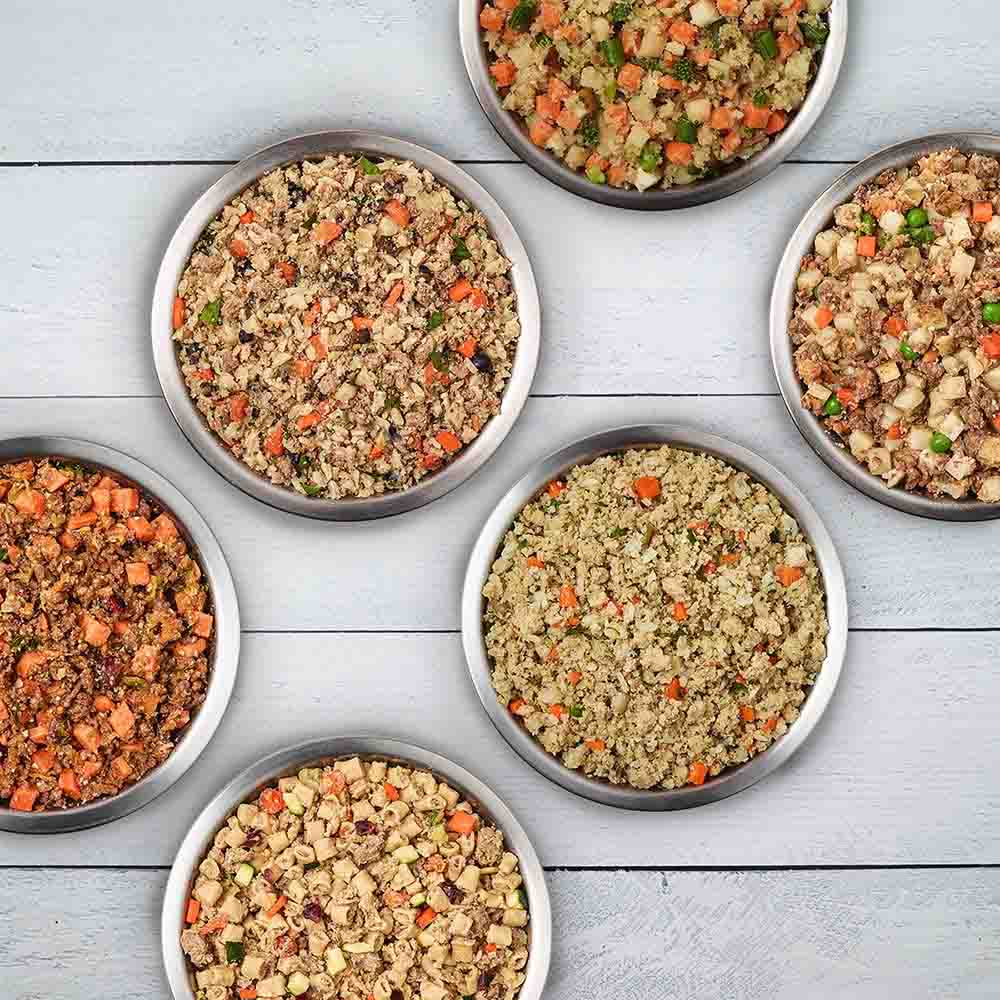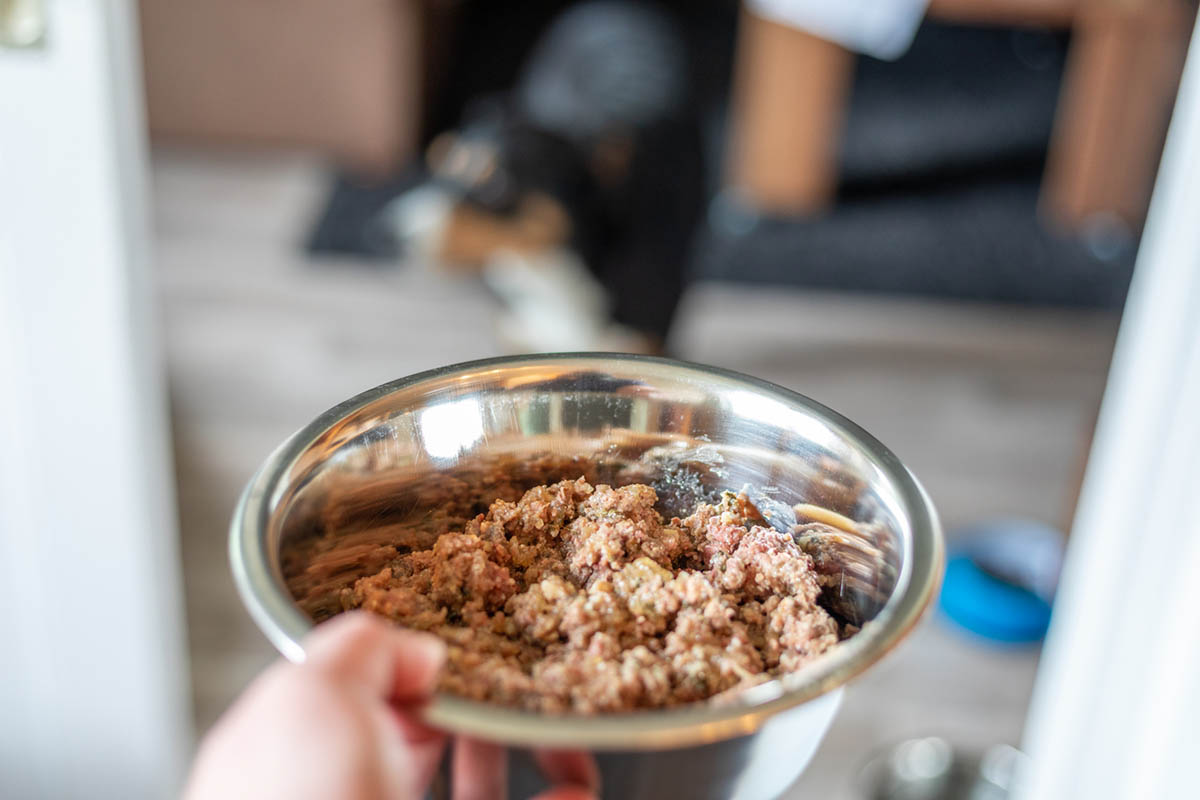With so many questionable ingredients in dog and cat food these days, it can be very confusing to know what’s okay and what’s not. One such food ingredient is very common in many dog food brands. It’s called carrageenan, and it’s typically used as a thickening agent so that foods appear more ‘loaf-like’. But is it something that your dog needs, and is it safe for dogs?
Let’s dive into what we know about carrageenan in dog food.
What Is Carrageenan?
Carrageenan is a product of Irish moss, which is an edible red seaweed. Manufacturers use it as a thickener or gelling agent in human food and pet food. It’s also in many other products for humans, like shampoo, gel air fresheners, and even diet soda.
Carrageenan is plant-based. As such, many people think it’s a vegan alternative to other food additives, like gelatin from animals. It’s also something you can find in organic foods, but does that mean it’s safe?
Typically, you can find carrageenan in canned pet foods, which are loaf-like, to help hold the shape. Therefore, it’s not usually in dry food; rather, it’s usually only in wet dog food. There have, however, been warnings about carrageenan as a food additive.
Is Carrageenan Safe for Your Dog’s Food?
There has been a lot of controversy over carrageenan as an ingredient in pet food. Much of the concern isn’t about the natural derivative that comes from seaweed; instead, it’s about the carrageenan extraction process.
Manufacturers extract carrageenan from seaweed using strong alkaline solvents. That means it’s highly processed. But there are even bigger problems than that.
There are different types of carrageenan, and one type — poligeenan carrageenan — causes gastrointestinal inflammation. In fact, researchers use poligeenan to intentionally cause intestinal inflammation in animal experiments.
It’s also a known carcinogen. That is to say, it may cause cancer. Researchers have found that carrageenan triggers your dog’s body to produce a molecule called Tumor Necrosis Factor-alpha, or TNF-⍺. This molecule causes two opposing reactions: it stimulates inflammation, and it causes apoptosis or cell death.
This helps create balance in the immune system since it defends against certain pathogenic organisms such as bacteria. On the surface that sounds like it’s a good thing, and that may be part of why many people in the wellness community recommend it.
Food-grade carrageenan isn’t necessarily safe
But, the problem is that TNF-⍺ has been implicated in certain chronic inflammatory diseases, like inflammatory bowel disease (IBD), asthma, and certain autoimmune diseases as well as cancer. Researchers have found that the digestive process can convert carrageenans to dangerous poligeenan, which then causes problems like IBD for both dogs and cats.
Therefore, even though some carageenan producers, pet food manufacturers, and even veterinary nutritionists say that food-grade carrageenan is safe for dogs, that isn’t necessarily true. Even food-grade carrageenan contains small percentages of those very damaging properties.
Additionally, yet another problem with carrageenan is that some seaweed sources, those coming from waters north of the equator, may be contaminated by radioactivity as a result of the Fukushima nuclear reactor site disaster. While most carrageenan comes from South American countries, any seaweed products harvested from the north are likely contaminated for the foreseeable future.
Other Research into the Effects of Carrageenan in Dogs
There have been a few other studies that show problems caused by carrageenan in pet food. One study demonstrates that carrageenan increases free radicals, which directly cause intestinal inflammation and have been implicated in the disruption of insulin metabolism. The latter can lead to diabetes.
Another study found that carrageenan is a factor in certain cancers. This study found specifically that it causes intestinal ulcers and neoplastic lesions (tumors). The authors of that study recommend that carrageenan should no longer be in use as a stabilizer, emulsifier, or thickening agent.
A different study finds, however, that carrageenan does not break down in the gut, and therefore doesn’t enter the body to cause negative effects. Specifically, this study found that carrageenan was not cytotoxic and didn’t cause inflammation by increasing the production of inflammatory proteins.
It’s easy, therefore, to see how confusing the research can be, and that can cause loving pet parents to fear making the wrong decision about what they should feed their best friends. As it turns out, many people and government agencies worry about the possible side effects of carrageenan.
Government Warnings About Carrageenan
The US Food and Drug Administration (FDA) categorizes carrageenan as GRAS, meaning that it is generally recognized as safe. The American Animal Feed Control Officials (AAFCO) have also said it is an acceptable emulsifier, stabilizer, and thickener. There are, however, several warnings about this common food additive.
The European Union bans its use in infant formulas, and the National Organic Standards Board (NOSB) recommends its removal from the list of approved organic ingredients. It cites that there is sufficient proof that there are safer alternatives, like guar gum, that are of use as a thickening agent.
In 2018, however, the US Department of Agriculture (USDA) ruled against the NOSB’s recommendation. So what can loving pet owners do?
Seek Carrageenan-Free, Human-Grade Nutrition

If you’re looking for a healthy food alternative for your best friend, you might check out fresh feeding. The recipes include high-quality ingredients that provide human-grade nutrition.
We are one of the only pet food companies offering whole, fresh ingredients free of preservatives and unnecessary by-products.
Our guiding principle is to support every pet’s life by providing them with human-grade nutrition in the form of tasty meals made with fresh, whole ingredients. We offer recipes in shelf-stable packaging and fresh frozen options. You can see the food in action at one of our many open-to-the-public kitchens.
We also have veterinary-prescribed meals for those pets with special needs. And we haven’t forgotten about dog treats.
With fresh, whole foods, you will see a big difference in your best friend’s health and vigor!
To learn more about carrageenan in dog food, visit The Cornucopia Institute’s website.
This post was reviewed and approved by a veterinarian.
This content is for informational use only and does not replace professional nutrition and/or medical advice, diagnosis, or treatment. It is not a substitute for and should not be relied upon for specific nutrition and/or medical recommendations. Please talk with your veterinarian about any questions or concerns.
